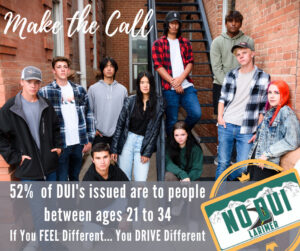
If you live in Colorado, you may know that DUIs are a major issue in our state. In fact, Colorado has one of the highest rates of DUI arrests in the country. This serious issue is being addressed in a number of ways by the state of Colorado and through groups like No DUI Larimer.
In Colorado, DUIs are a common occurrence. According to the Colorado Department of Transportation, there were 24,501 total DUI arrests in 2019. That’s an average of 67 DUI arrests per day! This number is staggering, and it’s even more concerning when you consider that it does not include out-of-state arrests. In terms of demographics, men are more likely to be arrested for DUIs than women. In 2019, men accounted for 78% of the DUI arrests in Colorado. Additionally, people between the ages of 21 and 34 were the most likely to be arrested for DUIs, accounting for nearly half of all arrests. It’s important to note that DUI arrests in Colorado have been steadily increasing over the past few years. In 2015, there were only 18,838 total DUI arrests. That’s an increase of nearly 30% in just four years.
The role of law enforcement and public safety is essential in keeping our communities safe. In addition to preventing and responding to crimes and other emergencies, law enforcement is essential in reducing the number of DUIs, or driving under the influence, and deadly incidents on our roads.
Impaired driving is a serious public safety hazard. It puts the lives of everyone on the road in danger, and it is a major cause of serious injuries and death. According to the National Highway Traffic Safety Association, in 2018, 10,511 people were killed in drunk driving crashes in the United States. This is an unacceptable number, and law enforcement is a key part of helping to reduce this number.
Law enforcement can be effective in reducing DUI incidents by increasing the visibility of police on the roads. DUI checkpoints, high-visibility DUI enforcement campaigns and community engagement are ways our Northern Colorado officers are working to decrease DUIs.

The No DUI Larimer steering committee decided to send out two members of the team out on ride-a-longs with our Loveland and Fort Collins DUI officers to see first-hand the important work they do. Below are some observations we had and things that surprised us, and may surprise you.
We need to eliminate the visual movies have been giving us about what the day-in-the-life of a police officer looks like.
Picture a person who is charged with protecting you daily and this is what you should see:
- Lightning fast data-entry. Computers hold information in a variety of platforms that assist our officers with research and report filing. Often things need to be entered quickly, or the opportunity passes for an arrest to be made or documents to be filed.
- Accuracy in data-entry. Similar to the need for speed, even the smallest error in a report (such as a typo on the date of filing) can change the outcome of someone’s life if there is an error on the documentation submitted.
- Eagle ears and eyes. Our officers are listening to multiple things going on around them… calls, conversations in the background, radio chatter, and more. Their ears are listening to everything at once. Combine that with eyes that are trained to look for the slightest movement, actions that do align with a story being told, and slight signals that show impairment from a huge bevvy of narcotics that can make our bodies move in a variety of ways.
- Knowledge of the law. The Colorado Peace Officer’s Handbook is nearly 2000 pages – small type, filled with every law and code our officers have learned.
- Our officers work at all hours and need to be prepared to recall laws, interact with the public and handle situations with speed and accuracy. DUI officers commonly have a late shift, requiring overnight hours.
- Conversational skills. Dealing with the public is not for everyone. Diffusing a heated situation, talking to individuals under the influence, dealing with defensiveness and confusion… interpersonal skills are a must.
- Showing up to work day after day, not knowing what situations you’ll be handed and putting your life on the line requires tremendous bravery.

All of this in a few hours of observation per shift. Our eyes were opened much more than we expected, and we were humbled to be in the presence of the officers we interacted with in Loveland and Fort Collins.
After three years of working on the No DUI Larimer campaign, we learned even more about what to look for and tips from law enforcement.
- As a general rule, officers are looking for the ‘abnormal.’ This can show up in many ways.
- Our officers are keenly aware that DUIs could happen to anyone. It does not discriminate. Often folks who they encounter are embarrassed and surprised that they had exceeded the legal limit. And there are others who are repeat offenders.
- Impaired driving is prevalent. Statistically, a person drives under the influence 80 times on average before ever receiving a DUI.
- No DUI Larimer’s campaign, “Make the Call” is something that officer Lowe found particularly compelling. Making the call has a variety of applications, as we intended. You can physically make a call to report a driver potentially under the influence, call for a ride home instead of driving, or make the right call in your decision making.

One thing we found particularly interesting is the general public’s hesitancy in calling 911 when seeing a driver potentially under the influence. Impaired driving is an emergency. Your call to 911 could save a life. And even if an officer is not in that immediate area to pull the driver over, getting that license plate and giving it to the 911 operator permanently records that plate in the shared database used by law enforcement. Multiple records of calls on that vehicle help officers, showing them a history of potentially dangerous driving.
In summary, our ride-a-long experiences were time well spent, seeing just a brief day in the life of a Northern Colorado DUI officer. We are grateful to their commitment to safety and to our community.



![Partners [Logo Reversed]](https://poweredbypartners.org/wp-content/uploads/2020/06/partners-horiz-no-tag-sm-rgb-color-purple.png)